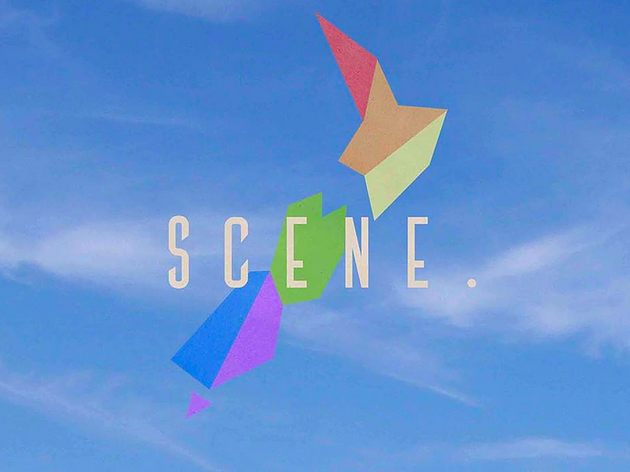Rosie Cann
Myself and those beside me found ourselves nodding along with stories, wanting to ask questions or contribute our own experiences of being queer in New Zealand. This was a gift of sitting in the front row - I couldn’t say how those further back experienced the show differently - but being on a level with cast mimicking real people on simple set pieces that read as very homely gave a beautiful texture of connection. This is something to explore in future productions of this show, how can this level, homely connection be emphasised and developed further?
The cast, made up of Jess Green, Ash Holden, Alayne Dick, Keagan Carr Fransch, Alex Rabina, Oliver Probert and Kelly Moen, was strong throughout. Documentary theatre comes with connotations of lifelessness but the actors were strong, distinct, precise, and modulated energy as best as you can while mimicking real movement and conversational pacing. Particularly special to me were Carr's older female embodiment, and Moen's gaystay.com embodiment, both of whom I found particularly beautiful.
The decision to cast regardless of gender or presentation was a strong one, which called the audience to really check their bias and judgement beyond the primary level. The eye-line of the actors was interesting, as it was often low, as in a face to face discussion, which detracted from the theatricality in general but again made the front row a very special place to be. The relation to the audience by the cast and the distillation of truth embodied in the variety of stories was wonderful to watch.
The structure of the show is clean, and edited thematically around significant aspects of lgbtq experience; coming out, professional gays, social changes, family, transitioning, misrepresentation and things we still need. This helped us as an audience to follow narrative threads as we cut between ‘characters’, however at times the snippets did not seem to quite fit within their sections, and a couple of characters fell away towards the end of the show, and were missed. The structure allowed us to talk with a range of people which was incredible, however due to this broadness we didn’t get to delve quite as deep with each person. Another symptom of documentary theatre can be that there is a lack of narrative arc, and as such Scene did not have the stakes for us to invest deeply in the ‘characters’ journeys in terms of holding our breath for them or really wanting to know what happened next, but perhaps this calls a political message to the forefront - these are regular people, there is no ending, there is only life and the personal relation of stories and the ongoing battle to be treated equally and with respect. Real life has no fanfare, no bow, only work and moments of joy.
Documentary theatre sadly leaves no room for actors reaction to the room or pacing with regard to the audience and what they are giving back to you as an actor, and several times lines were lost due to our joyful reactions to the text. This is an interesting conundrum, whether to sacrifice the pacing of the literal dialogue, or whether to be more present in the room and allow the audience that time to laugh, and although I appreciate the precision of the re-iterated text, I did miss that beat to share with the others around me for fear of missing more of the delicious text.
Scene also holds an importance to me as a historical document. This glimpse into the history of equal rights movement in New Zealand was an incredible learning experience, and really opened the audience up to acknowledging that equality is not a new fight, or an exclusively twenty-something-liberals-in-wellington fight. The whole country owns this narrative, people have been fighting for a long time. The stories of the older ‘characters’ were therefore of particular intrigue to me, and I am so glad to grasp a glimpse of our rich history. The race, gender and sexuality diversity in the cast was wonderful to see, and I really have nothing to say on it other than that it is a breath of fresh air to see more representation on our stages.
The lighting, AV and sound operator by Michelle Mae Cameron was effective and crisp. The lighting design, shared between Green and Cameron was warm and comfortable, and the set design, shared between Green and Zoe Joblin, contribute alongside lighting to the my-own-living-room vibe of the show, which can also be read politically. We all sit down on the same sofas at the end of the day.
Verbatim theatre holds a lot as a form, and this is one of the most strikingly new and fresh pieces I have experienced. These are not new stories but it is the first time hearing them for a lot of us, and what a gift! I trust that this is not the last we will see of this project by any means, and I am eager to see what comes of the work.






